We are pleased to announce that the Berkeley Engineering Design Scholars program has officially started. This summer, eight stellar Design Scholars will conduct engineering design research, guided by faculty and graduate student mentors. Over the summer, they will develop their design skills through program seminars and activities.
Learn more about the cohort below and mark your calendar for the Jacobs Summer Design Showcase on August 11th, at which the Scholars will present the results of their summer work.
You can also sign up to learn more about the program and next summer’s application information.
2023 Berkeley Engineering Design Scholars
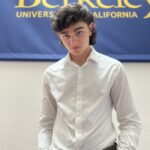
Name: Antonio Herrera
Major: Rising Junior in Mechanical Engineering
Faculty Advisor: Kosa Goucher-Lambert
Research Summary: Under PhD mentor Ananya Nandy in Professor Kosa Goucher-Lambert’s Co-Design Lab, I will be exploring the impact of AI-assisted decision making in the engineering design space. Our behavioral study tasks human subjects with choosing the optimal design for engine brackets given its CAD model, stress distribution simulation, and strength v. weight graph between two different designs; in addition to one of the models being suggested by our “AI model”. Unbeknownst to participants, the machine model is coded to suggest the better model only 71% of the time. My contributions to the study will be primarily in expanding upon findings from the initial study run last year, specifically looking to add more complexity in the optimization factors between the designs or adding explanations to the AI suggestions in the form of examples of other suggestions it would have made. I cannot wait to explore this fascinating field further and will hopefully be able to share some exciting findings in the near future!
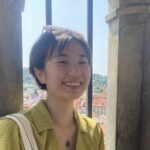
Name: Cathy Zhang
Major: Cognitive Science & German, Spring 2023 Grad
Faculty Advisor: Bjoern Hartmann
Research Summary: As a leading cause of disability worldwide, strokes leave many patients with motor and cognitive impairments that can severely impact their quality of life. Traditional rehabilitation methods require specialized facilities and personnel that are not accessible, with up to 6-months of wait time. Meanwhile, virtual reality(VR) headsets can be deployed to patient homes to facilitate rehabilitation with its immersive, physically interactive, and responsive attributes. Our research aims to develop a fully standalone VR program that makes remote physical therapy possible with the assistance of augmented reality enabled in VR headsets.
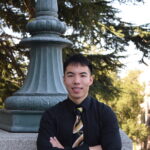
Name: Derrick Ma
Major: Bioengineering ’24
Faculty Advisor: Professor Hannah Stuart
Research Summary: Spinal cord injuries (SCI) cause dysfunction of the body’s sensory, motor, and autonomic systems below the level of injury, generating challenges for the individuals and their caretakers in everyday life. People with SCI at the C5-C7 cervical levels generally lose the ability to voluntarily flex their fingers and wrists, but maintain voluntary extension of the wrist. Taking advantage of this ability, researchers in the Embodied Dexterity Group (EDG) have developed a dorsal grasper device, which attaches supernumerary fingers to the back of the wrist and allows for grasping using wrist extension with the back of the hand in opposition. Previous iterations of the dorsal grasper have been developed for a research setting, with various bulky electronics and sensors weighing down the device. The objective of my research project is to develop dorsal grasper 3.0, recreating the device in a lightweight form factor applicable for everyday/home use. Rather than featuring complicated actuating fingers, the device will instead have mechanisms for moving simple fingers into place, then locking them there for the hand to grasp against.
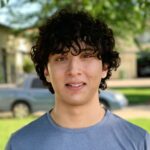
Name: Eduardo Godinez Diaz
Major: Mechanical Engineering/2025
Faculty Advisor: Hannah Stuart
Research Summary: This summer I’m doing research with the embodied dexterity group on a biomimetic fish robot. The goal is to study the tearing motion tropical fish perform when feeding on substrates. So far it’s been really cool and I’m excited to see where it goes next!
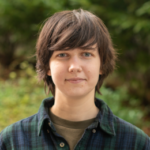
Name: Lucy Revina
Major: EECS/2024-ish
Faculty Advisors: Hila Mor, Katherine Song
Research Summary: The lab I am in, Hybrid Ecologies, and my mentors, Katherine Song and Hila Mor, work on adventurous materials, electronics, and design projects with the spirit of “unmaking.” I am particularly interested in unmake-able eco-friendly electronics, so my focus is on a decomposable, non-toxic battery alternative called “Vims.” My goal is to integrate these supercapacitors into various useful circuits and figure out the unknowns in the Vims fabrication process. To do this, there’s a lot I want to learn about prototyping and other sustainable technologies to integrate with. I also want to use my engineering background to characterize Vims in its different forms and extend a compelling argument for their various uses in time for a Fall workshop.
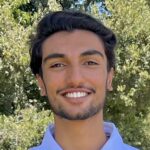
Name: Parjit Khakh
Major: Mechanical Engineering 2024
Faculty Advisor: Kosa Goucher-Lambert
Research Summary: In our increasingly AI-driven world, trust plays a vital role in fostering effective collaboration between humans and machines. The Trust Aware Human-Machine Teaming Using Real-Time Neurophysiological Data research project will develop a real-time measurement of human-machine trust by recording physiological signals in the brains of experiment participants as they interact with high- and low-performing robots conducting a sorting task in simulation. The relationship between AI performance and human confidence will be examined as the participants rate their levels of trust in the robots. The research team will use the data to build and compare different trust-prediction models, laying the foundation for research on trust in more complex interactions between people and machines.